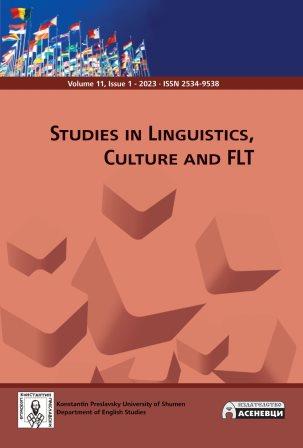The use of ditransitive constructions among L1 Lugbarati speakers of English in Uganda: A preliminary study
The use of ditransitive constructions among L1 Lugbarati speakers of English in Uganda: A preliminary study
Author(s): Peace Yikiru, Bebwa IsingomaSubject(s): Language and Literature Studies, Theoretical Linguistics, Applied Linguistics, Syntax, Descriptive linguistics
Published by: Шуменски университет »Епископ Константин Преславски«
Keywords: English; Uganda; ditransitive; Lugbarati; substrate influence;
Summary/Abstract: One of the important features of structural nativization of L2 varieties of English is how their grammar converges with and/or diverges from their parent variety, usually, British English. Building on Isingoma (2016, 2021a), this study is set out to augment discourse on verb complementational profile in Ugandan English, focusing on ditransitive constructions. Using naturalistic data from semi-structured interviews involving 50 participants from L1 Lugbarati (a Central Sudanic language) speakers of English, the study shows that the Prepositional Phrase Construction (PPC) involving goal verbs is preferred over the Double Object Construction (DOC) configuration. Moreover, our data did not have a single incidence of benefactive DOCs. Substrate influence from Lugbarati, among others, appears to be a contributing factor, given that DOCs are rare in this language, as they are constrained by the semantic criterion of ‘prior possession’ of the theme/patient by the recipient/beneficiary referent. The findings thus show that Isingoma’s (2016) monolithic generalizations about this phenomenon are debatable, as he indicates that the DOC is overwhelmingly acceptable with goal verbs in Ugandan English and that the particularities observed in ditransitive constructions in the variety are influenced by Bantu languages (where the DOC is the norm). Likewise, the assertion that Ugandans ubiquitously use the non-canonical PPC configuration for benefactive verbs (Isingoma, 2016) does not hold for L1 Lugbarati speakers of English, as the configuration was manifestly sporadic in our data, as opposed to the canonical PPC. The current study thus underscores the fact that there is substantial interspeaker variability in Ugandan English along ethnolinguistic lines (cf. Isingoma & Meierkord, 2022).
Journal: Studies in Linguistics, Culture, and FLT
- Issue Year: 11/2023
- Issue No: 1
- Page Range: 033-048
- Page Count: 16
- Language: English

